新概念英语第一册 Lesson 5完整版本
新概念英语第一册Lesson5教案
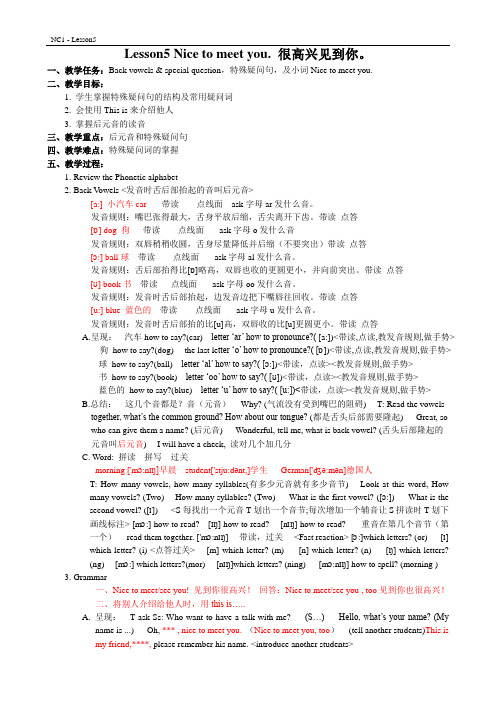
Lesson5 Nice to meet you. 很高兴见到你。
一、教学任务:Back vowels & special question,特殊疑问句,及小词Nice to meet you.二、教学目标:1. 学生掌握特殊疑问句的结构及常用疑问词2. 会使用This is来介绍他人3. 掌握后元音的读音三、教学重点:后元音和特殊疑问句四、教学难点:特殊疑问词的掌握五、教学过程:1. Review the Phonetic alphabet2. Back V owels <发音时舌后部抬起的音叫后元音>[a:]小汽车car --- 带读--- 点线面---ask字母ar发什么音。
发音规则:嘴巴张得最大,舌身平放后缩,舌尖离开下齿。
带读点答[ɒ] dog 狗--- 带读--- 点线面--- ask字母o发什么音发音规则:双唇稍稍收圆,舌身尽量降低并后缩(不要突出)带读点答[ɔ:]ball球---带读--- 点线面--- ask字母al发什么音。
发音规则:舌后部抬得比[ɒ]略高,双唇也收的更圆更小,并向前突出。
带读点答[ʊ]book书---带读---点线面--- ask字母oo发什么音。
发音规则:发音时舌后部抬起,边发音边把下嘴唇往回收。
带读点答[u:]blue 蓝色的---带读--- 点线面--- ask字母u发什么音。
发音规则:发音时舌后部抬的比[u]高,双唇收的比[u]更圆更小。
带读点答A.呈现:---汽车how to say?(car)---letter ‘ar’ how to pronounce?( [a:])<带读,点读,教发音规则,做手势>---狗how to say?(dog)--- the last le tter ‘o’ how to pronounce?( [ɒ])<带读,点读,教发音规则,做手势>---球how to say?(ball)---letter ‘al’ how to say?( [ɔ:])<带读,点读><教发音规则,做手势>---书how to say?(book)---letter ‘oo’ how to say?( [ʊ])<带读,点读><教发音规则,做手势>---蓝色的how to say?(blue)---letter ‘u’ how to say?( [u:])<带读,点读><教发音规则,做手势>B.总结:---这几个音都是?音(元音)--- Why? (气流没有受到嘴巴的阻碍) ---T: Read the vowelstogether, what’s the common ground? How about our tongue? (都是舌头后部需要隆起) --- Great, sowho can give them a name? (后元音) --- Wonderful, tell me, what is back vowel? (舌头后部隆起的元音叫后元音)--- I will have a check, 读对几个加几分C. Word: 拼读---拼写---过关morning ['mɔ:nɪŋ]早晨student['stju:dənt,]学生German['dʒə:mən]德国人T: How many vowels, how many syllables(有多少元音就有多少音节) ---Look at this word, Howmany vowels? (Two) ---How many syllables? (Two) --- What is the first vowel? ([ɔ:]) --- What is thesecond vowel? ([ɪ]) --- <S每找出一个元音T划出一个音节;每次增加一个辅音让S拼读时T划下画线标注> [mɔ:] how to read?---[ɪŋ] how to read? ---[nɪŋ] how to read? --- 重音在第几个音节(第一个)--- read them together. ['mɔ:nɪŋ] ---带读,过关--- <Fast reaction> [ɔ:]which letters? (or) --- [ɪ]which letter? (i) <点答过关> ---[m] which letter? (m) --- [n] which letter? (n) --- [ŋ] which letters?(ng) ---[mɔ:] which letters?(mor) ---[nɪŋ]which letters? (ning) --- [mɔ:nɪŋ] how to spell? (morning )3. Grammar一、Nice to meet/see you! 见到你很高兴!回答:Nice to meet/see you , too见到你也很高兴!二、将别人介绍给他人时,用this is…..A. 呈现:---T ask Ss: Who want to have a talk with me? --- (S…) --- Hello, what’s your name? (Myname is ...) --- Oh, *** , nice to meet you. (Nice to meet you, too)--- (tell another students)This ismy friend,****, please remember his name. <introduce another students>B. 讲解:--- Ok, please tell me: what did I do just now? (交朋友,然后把朋友介绍给别人) --- good,那么我们交到朋友了,要对他说?(Nice to meet you)<板书,带读,背诵> --- what’s the meaning?( 很高兴见到你。
新概念英语第一册Lesson5-6Nicetomeetyou小学英语-教学设计教案-初中英语全国通用
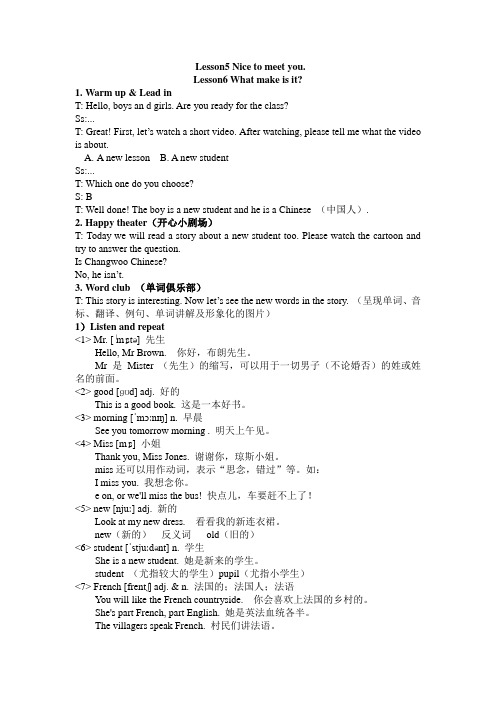
Lesson5 Nice to meet you.Lesson6 What make is it?1.Warm up & Lead inT: Hello, boys an d girls. Are you ready for the class?Ss:...T: Great! First, let’s watch a short video. After watching, please tell me what the video is about.A.A new lessonB. A new studentSs:...T: Which one do you choose?S: BT: Well done! The boy is a new student and he is a Chinese (中国人).2.Happy theater(开心小剧场)T: Today we will read a story about a new student too. Please watch the cartoon and try to answer the question.Is Changwoo Chinese?No, he isn’t.3.Word club (单词俱乐部)T: This story is interesting. Now let’s see the new words in the story. (呈现单词、音标、翻译、例句、单词讲解及形象化的图片)1)Listen and repeat<1> Mr. [ˈmɪstə] 先生Hello, Mr Brown. 你好,布朗先生。
Mr 是Mister (先生)的缩写,可以用于一切男子(不论婚否)的姓或姓名的前面。
<2> good [ɡʊd] adj. 好的This is a good book. 这是一本好书。
新概念英语Lesson 5
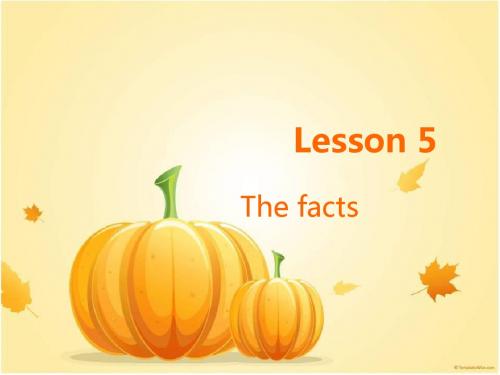
• circle 圆圈;around 坏绕
• weight 体重;width 宽度;length 长度
• meanwhile adv. 同时
• at the same time 同时
• refuse v. 拒绝
• refuse to do sth=be unwilling to do sth 不愿意做某事
• • • • • • •
well-known 为复合形容词,修饰magzine n. + adj. life-long 终生的 adj.+adj. red-hot 炙手可热的 n.+ v.-ing peace-loving 热爱和平的 n.+v.-ed man-made 人造的 adj.+ v.-ing good-looking 漂亮的 adj. + v.-ed kind-hearted 仁慈的
• the Summer Palace 颐和园; the Palace Museum 故 宫; • the White House 白宫
• publish v. 出版,发表
• fax n. 传真
• letter 信件;delivery 快递; typewriter 打字机
• impatient adj. 不耐烦的
• anxious焦虑的;irritated易怒的; • hot-tempered暴 解雇
• dismiss 开除;expel 开除
• originally adv. 起初,原先
• in the beginning 开始
• instruct v. 吩咐,指示
• Not only had the poor man been arrested, but he had been sent to prison as well. • not only 放在句首引起部分倒装 • 倒装有时是句子结构需要,有时是表示强调修辞手法需要。 • only所修饰的副词,介词短语或状语从句放在句首时,要用: • only+ 状语+ be /助动词/情态动词+主语及其他 • Only when he told me the news did I know what had happened. • Only in this way can you make progress in your English. • Only through education can we rise in the world.
新概念英语第一册Lesson5-6课

在英语口语中,如果希望别人给自己“出 示” 什么东西时,通常是“要什么直接说什 么”。
eg: 请出示你的票。 Your ticket, please. 请让我看看你的护照。 Your passport, please. 请告诉我你的名字。 Your name, please.
Swedish
Stockholm is ___________
Swedciasphital.
Sweden 瑞典 Swedish 瑞典人
瑞典的
Remember ?
国家:
Fill in the blanks:
1.He is from Japan. He's _J_a_p_a__n_e_s_e_.
England 英国 English 英国人
英国的
It's from America.
American
It's
an_A__m__e_r_i_c_a_n__president.
America 美国 American 美国人
美国的
It's from Switzerland.
Swit Swiss
Lesson 5&6
Where is it from ?
It's from China.
Chinese
It's a _C_h__in__e_s_e_cartoon.
China Chinese
中国
中国人 中国的
It's from Japan.
Japanese
It's
a_J_a__p_a_n__e_s_e__mountain.
Thank you, sir. Number five.
新概念英语第一册第5_6课_ppt
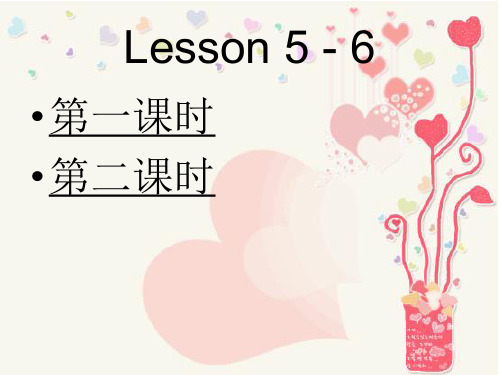
a 一个,一辆 ,一只… 例如 a car 表示一个还可以用 an,例如 an apple
a 与 an 在英语被称为不定冠词,二者在意义上没 有区别,但是,在发音以辅音音素开头的词前用a; 在发音以元音音素开头的词前用an。
主格代词顺口溜: 我是I ,你是You ; 男他He ,女她She ,动物的它是It; 我们We ,你们You ,他们They. Who are you ?
And this is Chang-woo. He’s Korean. “Nice to meet you .”
he’s = he is he’s 是 he is 的缩写形式 she’s = she is she’s 是 she is 的缩写形式 it’s = it is it’s 是 it is 的缩写形式
And this is Luming. He’s Chinese .
“Nice to meet you .”
And this is Xiaohui . She’s Chinese , too .
“Nice to meet you .”
总结
• 早上打招呼 答语是
• 介绍别人
Nice to meet you.nice 美好的 ;meet 遇见 很高兴见到你。
练习2
• 看书上12页练习B This is Miss Sophie Dupont. French/(Swedish) Is she a French student or a Swedish student? She isn't a Swedish student. She's a French student.
英语国家中人的姓名通常由3部分组 成,即:名+中间名+姓。 在一般情况下,不用中间名。在熟悉 的人中间,以名相称,而在正式的场 合中常用 Mr.(先生),Mrs.(太 太),Miss(小姐)或Ms.(女士) 这些称呼再加上姓。
新概念英语第一册 Lesson5~6带答案)(共40张PPT)

记忆面包条 --好句推荐 This is … 用来介绍某人,这是... Nice to meet you. 见到你很高兴。
Grammar
1. 不定冠词的使用
冠词: 不定冠词(a, an) 定冠词(the)
三个冠 词 the an
a
分类
定冠词 不定冠 词
不定冠 词
用法
详见L25-26 重点语法2
2.雨 水 管 、 污 水管 发生堵 塞、冒 溢; 3.门 、 窗 安 装 不密 闭,出现 翘裂; 4.墙 面 、 顶 棚 抹灰 层脱落 ; 5.照 明 线 路 发 生故 障;
屋 面 防 水 保 修3年,其 他部 位、部 件的保 修期限 ,由房地 产开发 企业与 用户自 行约定 。
因 住户使 用、装 修不当 或
Vocabulary
(6) 国家和国籍
France
I am French.
Vocabulary
Germany
I am German.
Vocabulary
Japan I am Japanese.
Vocabulary
Korea
I am Korean.
I am Korean , too
Vocabulary
Vocabulary
课文原句重现:She is French. 表达:表示国籍的名词前通常没有冠词。表示国 籍的词,首字母要_大_写______。 判断对错:
I am Chinese. (__√__) I am a Chinese. (_×___)
Vocabulary
(7) nice adj. 美好的 e.g. _T_h_i_s_d_r_e_s_s_i_s _v_e_ry__n_ic_e_.__________.
新概念英语第一册Lesson 5 Nice to meet you
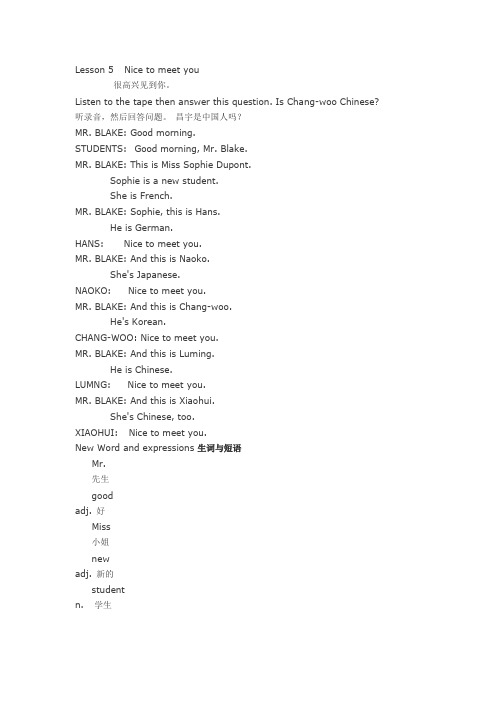
Lesson 5 Nice to meet you很高兴见到你。
Listen to the tape then answer this question. Is Chang-woo Chinese? 听录音,然后回答问题。
昌宇是中国人吗?MR. BLAKE: Good morning.STUDENTS: Good morning, Mr. Blake.MR. BLAKE: This is Miss Sophie Dupont.Sophie is a new student.She is French.MR. BLAKE: Sophie, this is Hans.He is German.HANS: Nice to meet you.MR. BLAKE: And this is Naoko.She's Japanese.NAOKO: Nice to meet you.MR. BLAKE: And this is Chang-woo.He's Korean.CHANG-WOO: Nice to meet you.MR. BLAKE: And this is Luming.He is Chinese.LUMNG: Nice to meet you.MR. BLAKE: And this is Xiaohui.She's Chinese, too.XIAOHUI: Nice to meet you.New Word and expressions 生词与短语Mr.先生goodadj. 好Miss小姐newadj. 新的studentn. 学生Frenchadj. & n. 法国人Germanadj. & n. 德国人niceadj. 美好的meetv. 遇见Japaneseadj. & n. 日本人Koreanadj. & n. 韩国人Chineseadj. & n. 中国人tooadv. 也本文参考译文布莱克先生:早上好。
新概念英语第一册 Lesson 5完整版本
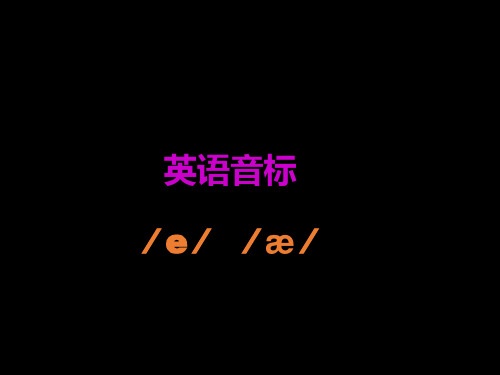
• 掌握两课中的单词及专业词汇。 • 熟练运用课堂所讲解的日常用语。
What is the country?
• China • Japan • Korea • France • England
Chinese Japanese Korean French English
课文讲解
• Morning用法拓展 • 1,in the morning
• 2,在星期天早上: on Sunday morning • 3,在一个冬天的早晨: on a winter morning
• Eg:I go to school____8 o’clock in the morning. A.at B.in C.on D.for
he
France 法国
[fra:ns]
French 法国人
[frentʃ]
he
Germany 德国
[’dʒə:məni]
巴拉克
German 德国人
[’dʒə:mən]
某国
(中) China [‘t∫aɪnə]
(日) Japan [dʒə‘pæ n]
(韩) Korea [kə’riə]
(德) Germany [’dʒɜ:məni]
What is the country?
• America • Italy • Sweden • Germany
American Italian
Swedish German
Details on new words
• 国家及人的表达: • 1、-ese: ____________________ • 2、-n: ______________________ • 3、-ish: _____________________ • 4、-ch: _____________________
新概念英语第一册第5课_课件

五. Chant :
宾格代词顺口溜: The end !
我是me,你是You ;
男他him ,女她her ,动物的它是 It;
我们us ,你们You ,他们them.
Homework 1.一课一练5,6课 2.课单词背写,准备听写 3.背诵第5课课文。
[ɔ]
闭音节中的o
job clock long song shop stop lost got boss hot
a 发[ɔ]的 watch water
句子
1. She lost that job, but she got this job.
2. The clock often stops. 3. The boss lost a clock
Chinese---China French---France
France
eg. I come from France. I’m from France. 我来自法国。
German---Germany
---Are you a _____ (德国人)? ---Yes, I am. eg. He can speak _____
ቤተ መጻሕፍቲ ባይዱ
nice 同义词good
eg. You are a nice boy. It’s a nice day. It’s a nice food.
meet 同音词meat
非正式问候---Nice to meet you.
--- Nice to meet
you, too.
正式问候 --- How do you do?
She is (a) French.
美好的 nice 见到你很高兴。 Nice to meet you. 遇见 meet
新概念第一册英语lesson5-6

1 问候语 2 Mr. sir用法 3 介绍某人This is``` 4 国人表达法:主语 +be+国籍 5 很高兴见到你的几种 表达方式 7课文背诵
Lesson 6
What make is it?
Swedish
瑞典的;瑞 典人 Sweden 瑞典
English 英国的;英国人 England 英国
Mr. sir用法
Mr.用于男士的姓之前, 不能单独用. E.g.: Mr. Blake. sir 一般单独使用,是对长 者、上司或男顾客的尊 称 E.g. Sorry, sir. 对不起,先生。
三介绍他人 这是索菲亚 · 杜邦小姐。 This is 〈Miss Sopphie Dopont〉. 主语 系动词 表语
And this is Luming. He’s _________ Chinese. .
“Nice to meet you .”
“Nice to meet you .”
And this is Xiaohui . She’s Chinese , ______. too
看图片背
课堂总结
Xiaohui
昌宇
晓惠
课文提问
A story about a new student. Listen and answer 1 How many students are there? 2 Is Sophie German? 3 Is Hans French? translate 4 What nationality is Naoko? 5 What nationality is Chang-woo? 6 Where does Luming come from? 7 What’s the name of the Chinese girl? Listen again and translate.(close the books)
新概念英语第一册课后练习题答案:Lesson5

Lesson 5 阅读理解
答案与解析
4
1. T。
根据⽂章第⼀句可知。
2. F。
We go to school at seven in the morning.的意思是:我们早晨七点去上学,⽽不是下午。
3. T。
由I have a clock...on the desk 可知。
4. F。
由...Jim has a new watch 可知。
5. F。
阅读短⽂可知现在时间是四点⼆⼗五分,⽽不是四点四⼗五分。
答案与解析
1. 从Is this your pen, Jim?来看,问的是钢笔。
应填pen。
2. It was on my desk.已经指明,它在Sue 的课桌上。
要填desk。
3. 对话中提到,Jim 看见了书上的名字。
故应填name。
4. Sue 在问她的书在哪⼉,Jim 说在她的书包⾥。
应当填写book。
5. Jim 告诉了Sue 她的书包在Han Mei 的课桌上,说明他看见了。
该空要填bag。
英汉翻译
1. Good morning.
2. This is Mary. She is a new student.
3. Nice to meet you.
4. He is Chinese.
5. I am Japanese.
6. She is French.
7. How do you do?
8. He is a Korean teacher.。
新概念英语第一册单词完整版
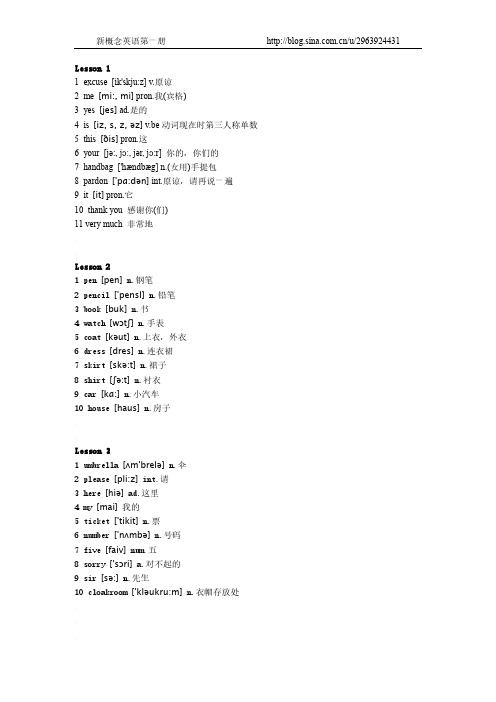
1excuse[ik'skju:z] v.原谅2me[mi:, mi] pron.我(宾格)3yes[jes] ad.是的4is[iz, s, z, əz] v.be动词现在时第三人称单数5this[ðis] pron.这6your[jə:, jɔ:, jər, jɔ:r] 你的,你们的7handbag['hændbæg] n.(女用)手提包8pardon['pɑ:dən] int.原谅,请再说一遍9it[it] pron.它10thank you感谢你(们)11 very much非常地Lesson 21 pen [pen] n.钢笔2 pencil ['pensl] n.铅笔3 book [buk] n.书4 watch [wɔtʃ] n.手表5 coat [kəut] n.上衣,外衣6 dress [dres] n.连衣裙7 skirt [skə:t] n.裙子8 shirt [ʃə:t] n.衬衣9 car [kɑ:] n.小汽车10 house [haus] n.房子Lesson 31 umbrella [ʌm'brelə] n.伞2 please [pli:z] int.请3 here [hiə] ad.这里4 my [mai]我的5 ticket ['tikit] n.票6 number ['nʌmbə] n.号码7 five [faiv] num.五8 sorry ['sɔri] a.对不起的9 sir [sə:] n.先生10 cloakroom ['kləukru:m] n.衣帽存放处1 suit [su:t, sju:t] n.一套衣服 4 son [sʌn] n.儿子2 school [sku:l] n.学校3 teacher ['ti:tʃə] n.老师 5 daughter ['dɔ:tə] n.女儿Lesson 51 Mr. ['mistə]先生2 good [gud] a.好3 morning ['mɔ:niŋ] n.早晨4 Miss [mis]小姐5 new [nju:] a.新的6 student ['stju:dənt] n.学生7 French [frentʃ] a.& n.法国人8 German ['dʒə:mən] a.& n.德国人9 nice ['nais] a.美好的10 meet [mi:t] v.遇见11 Japanese [ˌdʒæpə'ni:z] a.& n.日本人12 Korean [kə'riən] a.& n.韩国人13 Chinese [ˌtʃai'ni:z] a.& n.中国人14 too [tu:] ad.也Lesson 61 make [meik] n.(产品的)牌号2 Swedish ['swi:diʃ] a.瑞典的3 English ['iŋgliʃ] a.英国的4 American [ə'merikən] a.美国的5 Italian [i'tæliən] a.意大利的6 Volvo ['vɔlvəʊ] n.沃尔沃7 Peugeot n.标致 8 Mercedes ['mə:sidi:z] n.梅赛德斯9 Toyota ['təʊjəʊtə] n.丰田 10 Daewoo n.大宇11 Mini ['mini] n.迷你 12 Ford [fɔ:d] n.福特13 Fiat ['faiæt, -ət] n.菲亚特Lesson 71 I [ai] pron.我2 am [m, əm, æm] v.be动词现在时第一人称单数3 are [ɑ:] v.be动词现在时复数4 name ['neim] n.名字5 what [wɔt, wɑ:t] a.& pron.什么6 nationality [ˌnæʃə'næliti] n.国籍7 job [dʒɔb] n.工作8 keyboard ['ki:bɔ:d] n.电脑键盘9 operator ['ɔpəreitə] n.操作人员10 engineer [ˌendʒi'niə] n.工程师1 policeman [pə'li:smən] n.警察2 policewoman [pə'li:s,wumən] n.女警察3 taxi driver 出租汽车司机4 air hostess 空中小姐5 postman ['pəustmən] n.邮递员6 nurse [nə:s] n.护士7 mechanic [mi'kænik] n.机械师8 hairdresser ['heəˌdresə] n.理发师9 housewife ['hauswaif] n.家庭妇女10 milkman ['milkmən] n.送牛奶的人Lesson 91 hello [hə'ləu] int.喂(表示问候)2 hi [hai] int.喂,嗨3 how [hau] ad.怎样4 today [tə'dei] ad.今天5 well [wel] a.身体好6 fine [fain] a.美好的7 thanks [θæŋks] int.谢谢8 goodbye [ˌgud'bai] int.再见9 see [si:] v.见Lesson 101 fat [fæt] a.胖的2 woman ['wumən] n.女人3 thin [θin] a.瘦的4 tall [tɔ:l] a.高的5 short [ʃɔ:t] a.矮的6 dirty ['də:ti] a.脏的7 clean [kli:n] a.干净的 8 hot [hɔt] a.热的9 cold [kəuld] a.冷的10 old [əuld] a.老的11 young [jʌŋ] a.年轻的12 busy ['bizi] a.忙的13 lazy ['leizi] a.懒的Lesson 111 whose [hu:z] pron.谁的2 blue [blu:] a.蓝色的3 perhaps [pə'hæps] ad.大概4 white [wait] a.白色的5 catch [kætʃ] v.抓住1 father ['fɑ:ðə] n.父亲2 mother ['mʌðə] n.母亲3 blouse [blauz] n.女衬衫4 sister [sistə] n.姐,妹5 tie [tai] n.领带6 brother ['brʌðə] n.兄,弟7 his [hiz]他的 8 her [hə:]她的Lesson 131 colour ['kʌlə] n.颜色2 green [gri:n] a.绿色3 come [kʌm] v.来4 upstairs [ˌʌp'steəz] ad.楼上5 smart [smɑ:t] a.时髦的,巧妙的6 hat [hæt] n.帽子7 same [seim] a.相同的8 lovely ['lʌvli] a.可爱的,秀丽的Lesson 141 case [keis] n. 箱子2 carpet ['kɑ:pit] n. 地毯3 dog [dɔg] n. 狗Lesson 151 Customs ['kʌstəmz] n. 海关2 officer ['ɔfisə] n. 官员3 girl [gə:l] n. 女孩,姑娘4 Danish ['deiniʃ] a.& n. 丹麦人5 friend ['deiniʃ] a.& n. 丹麦人6 Norwegian [nɔ:'wi:dʒən] a.& n. 挪威人7 passport['pɑ:spɔ:t] n.护照8 brown[braun] a. 棕色的9 tourist ['tuərist] n. 旅游者Lesson 161 Russian ['rʌʃən] a.& n. 俄罗斯人2 Dutch [dʌtʃ] a.& n. 荷兰人3 these [ði:z] pron. 这些(this的复数)4 red [red] a. 红色的5 grey [grei] a. 灰色的6 yellow ['jeləu] a. 黄色的7 black [blæk] a. 黑色的8 orange ['ɔrindʒ] a. 橘黄色的1 employee [im'plɔi-i:] n.雇员2 hard-working ['hɑ:dwə:kiŋ] a. 勤奋的3 sales reps 推销员4 man [mæn] n. 男人5 office ['ɔfis] n. 办公室6 assistant [ə'sistənt] n. 助手Lesson 191 matter ['mætə] n. 事情2 children ['tʃildrən] n. 孩子们(child 的复数)3 tired ['taiəd] a. 累,疲乏4 boy [bɔi] n. 男孩5 thirsty ['θə:sti] a. 渴6 mum ['mʌm] n. 妈妈(儿语)7 sit down [ˌsit'daun] 坐下8 right [rait] a. 好,可以9 ice cream [ˌais'kri:m] 冰淇淋Lesson 201 big [big] a.大的2 small [smɔ:l] a.小的3 open ['əupən] a.开着的4 shut [ʃʌt] a.关着的5 light [lait] a.轻的6 heavy ['hevi] a.重的7 long [lɔŋ] a.长的8 shoe [ʃu:] n.鞋子9 grandfather ['grændˌfɑ:ðə] n.祖父,外祖父10 grandmother ['grænˌmʌðə] n.祖母,外祖母Lesson 211 give [giv] v. 给2 one [wʌn] pron. 一个3 which [witʃ] 哪一个1 empty ['empti] a.空的2 full [ful] a.满的3 large [lɑ:dʒ] a.大的4 little ['litl] a.小的5 sharp [ʃɑ:p] a.尖的,锋利的6 small [smɔ:l] a.小的7 big [big] a.大的8 blunt [blʌnt] a.钝的9 box [bɔks] n.盒子,箱子10 glass [glɑ:s] n.杯子11 cup [kʌp] n.茶杯12 bottle ['bɔtl] n.瓶子13 tin [tin] n.罐头14 knife [naif] n.刀子15 fork [fɔ:k] n.叉子Lesson 231 on [ɔn] prep. 在…之上2 shelf [ʃelf] n. 架子,搁板Lesson 241 desk [desk] n.课桌2 table ['teibəl] n.桌子3 plate [pleit] n.盘子4 cupboard ['kʌbəd] n.食橱5 cigarette [ˌsigə'ret] n.香烟6 television ['teliˌviʒən, ˌteli'viʒən] n.电视机7 floor [flɔ:] n.地板8 dressing table 梳妆台9 magazine [ˌmægə'zi:n] n.杂志10 bed [bed] n.床11 newspaper ['nju:sˌpeipə] n.报纸12 stereo ['steriəu, 'stiər-] n.立体声音响Lesson 251 Mrs. ['misiz]夫人2 kitchen ['kitʃin] n.厨房3 refrigerator [ri'fridʒəreitə] n.电冰箱4 right [rait] n.右边5 electric [i'lektrik] a.带电的,可通电的6 left [left] n.左边7 cooker ['kukə] n.炉子,炊具8 middle ['midl] n.中间9 of [əv, ə, ɔv] prep.(属于)…的10 room [ru:m] n.房间11 cup [kʌp] n.杯子1 where [weə] ad.在哪里2 in [in] prep.在…里Lesson 271 living room ['liviŋ ru:m]客厅2 near [niə] prep.靠近3 window ['windəu] n.窗户4 armchair ['ɑ:mtʃeə] n.手扶椅5 door [dɔ:] n.门6 picture ['piktʃə] n.图画7 wall [wɔ:l] n.墙Lesson 281 trousers ['trauzəz] n.〔复数〕长裤Lesson 291 shut [ʃʌt] v.关门2 bedroom ['bedrum, -ru:m] n.卧室3 untidy [ˌʌn'taidi] a.乱,不整齐4 must [mʌst] modal verb.必须,应该5 open ['əupən] v.打开6 air [eə] v.使…通风,换换空气7 put [put] v.放置8 clothes [kləuðz] n.衣服9 wardrobe ['wɔ:drəub] n.大衣柜10 dust [dʌst] v.掸掉灰尘11 sweep [swi:p] v.扫Lesson 301 empty ['empti] v.倒空,使…变空2 read [ri:d] v.读3 sharpen ['ʃɑ:pən] v.削尖,使锋利4 put on [ˌput'ɔn]穿上5 take off 脱掉6 turn on [tə:n ɔn]开(电灯)7 turn off 关(电灯)1 garden ['gɑ:dn] n.花园2 under ['ʌndə] prep.在…之下3 tree [tri:] n.树4 climb [klaim] v.爬,攀登5 who [hu:] pron.谁6 run [rʌn] v.跑7 grass [grɑ:s] n.草,草地8 after ['ɑ:ftə] prep.在…之后9 cat [kæt] n.猫Lesson 321 type [taip] v.打字2 letter ['letə] n.信3 basket ['bɑ:skit] n.篮子4 eat [i:t] v.吃5 bone [bəun] n.骨头6 clean [kli:n] v.清洗7 tooth [tu:θ] n.牙齿8 cook [kuk] v.做(饭菜)9 milk [milk] n.牛奶10 meal [mi:l] n.饭,一顿饭11 drink [driŋk] v.喝12 tap [tæp] n.(水)龙头Lesson 331 day [dei] n.日子 15 fly [flai] v.飞2 cloud [klaud] n.云3 sky [skai] n.天空4 sun [sʌn] n.太阳5 shine [ʃain] v.照耀6 with [wið, wiθ] prep.和…在一起7 family ['fæməli] n.家庭(成员)8 walk [wɔ:k] v.走路,步行9 over ['əuvə] prep.跨越,在…之上10 bridge [bridʒ] n.桥11 boat [bəut] n.船12 river ['rivə] n.河13 ship [ʃip] n.轮船14 aeroplane ['eərəplein] n.飞机1 sleep [sli:p] v.睡觉2 shave [ʃeiv] v.刮脸3 cry [krai] v.哭,喊4 wash [wɔʃ] v.洗5 wait [weit] v.等6 jump [dʒʌmp] v.跳Lesson 351 photograph ['fəutəgrɑ:f] n.照片 15 into ['intu, 'intə] prep.进入2 village ['vilidʒ] n.村庄3 valley ['væli] n.山谷 14 park [pɑ:k] n.公园4 between [bi'twi:n] prep.在…之间5 hill [hil] n.小山6 another [ə'nʌðə] prep.另一个7 wife [waif] n.妻子8 along [ə'lɔŋ] prep.沿着9 bank [bæŋk] n.河岸10 water ['wɔ:tə] n.水11 swim [swim] v.游泳12 across [ə'krɔs] prep.横过13 building ['bildiŋ] n.大楼,建筑物Lesson 361 beside [bi'said] prep.在…旁2 off [ɔf] prep.离开Lesson 371 work [wə:k] v.工作2 hard ['hɑ:d] ad.努力地3 make [meik] v.做4 bookcase ['buk-keis] n.书橱,书架5 hammer ['hæmə] n.锤子6 paint [peint] v.上漆,涂7 pink [piŋk] n.& a.粉红色8 favourite ['feivərit] a.最喜欢的Lesson 381 homework ['həumwə:k] n.作业2 listen ['lisən] v.听3 dish [diʃ] n.盘子,碟子1 front [frʌnt] n.前面2 in front of 在…之前3 careful ['keəful] a.小心的,仔细的4 vase [vɑ:z, veis, veiz] n.花瓶5 drop [drɔp] v.掉下6 flower ['flauə] n.花Lesson 401 show [ʃəu] v.给…看2 send [send] v.送给3 take [teik] v.带给Lesson 411 cheese [tʃi:z] n.乳酪,干酪2 bread [bred] n.面包3 soap [səup] n.肥皂4 chocolate ['tʃɔklit] n.巧克力5 sugar ['ʃugə] n.糖6 coffee ['kɔfi] n.咖啡7 tea [ti:] n.茶8 tobacco [tə'bækəu] n.烟草,烟丝Lesson 421 bird [bə:d] n.鸟2 any ['eni] det.一些3 some [sʌm] det.一些Lesson 431 of course [əv'kɔ:s]当然2 kettle ['ketl] n.水壶3 behind [bi'haind] prep.在…后面4 teapot ['ti:pɔt] n.茶壶5 now [nau] ad.现在,此刻6 find [faind] v.找到7 boil [bɔil] v.沸腾,开Lesson 451 can [kæn]能够2 boss [bɔs] n.老板,上司3 minute ['minit, mai'nju:t] n.分(钟)4 ask [ɑ:sk] v.请求,要求5 handwriting ['hændˌraitiŋ] n.书写6 terrible ['terəbəl] a.糟糕的,可怕的1 lift [lift] v.拿起,搬起,举起2 cake [keik] n.饼,蛋糕3 biscuit ['biskit] n.饼干Lesson 471 like [laik] v.喜欢,想要2 want [wɔnt, wɑ:nt] v.想Lesson 481 fresh [freʃ] a.新鲜的2 egg [eg] n.鸡蛋3 butter ['bʌtə] n.黄油4 pure [pjuə] a.纯净的5 honey ['hʌni] n.蜂蜜6 ripe [raip] a.成熟的7 banana [bə'nɑ:nə] n.香蕉8 jam [dʒæm] n.果酱9 sweet [swi:t] a.甜的10 orange ['ɔrindʒ] n.橙11 Scotch whisky 苏格兰威士忌12 choice [tʃɔis] a.上等的,精选的13 apple ['æpəl] n.苹果14 wine [wain] n.酒,果酒15 beer [biə] n.啤酒16 blackboard ['blækbɔ:d] n.黑板Lesson 491 butcher ['butʃə] n.卖肉的2 meat [mi:t] n.(食用)肉3 beef [bi:f] n.牛肉4 lamb [læm] n.羔羊肉5 husband ['hʌzbənd] n.丈夫6 steak [steik] n.牛排7 mince [mins] n.肉馅,绞肉8 chicken ['tʃikin] n.鸡9 tell [tel] v.告诉10 truth [tru:θ] n.实情11 either ['aiðə] ad.也(用于否定句)1 tomato [tə'mɑ:təu] n.西红柿2 potato [pə'teitəu] n.土豆3 cabbage ['kæbidʒ] n.卷心菜4 lettuce ['letis] n.莴苣5 pea [pi:] n.豌豆6 bean [bi:n] n.豆角7 pear [peə] n.梨8 grape [greip] n.葡萄9 peach [pi:tʃ] n.桃Lesson 511 Greece [gri:s] n.希腊2 climate ['klaimit] n.气候3 country ['kʌntri] n.国家4 pleasant ['plezənt] a.宜人的5 weather ['weðə] n.天气6 spring [spriŋ] n.春季7 windy ['windi] a.有风的 8 warm [wɔ:m] a.温暖的9 rain [rein] v.下雨 10 sometimes ['sʌmtaimz] ad.有时11 summer ['sʌmə] n.夏天 12 autumn ['ɔ:təm] n.秋天13 winter ['wintə] n.冬天 14 snow [snəu] v.下雪15 January ['dʒænjuəri] n.1月 16 February ['februəri] n.2月17 March [mɑ:tʃ] n.3月 18 April ['eiprəl] n.4月19 May [mei] n.5月 20 June [dʒu:n] n.6月21 July [dʒu'lai] n.7月22 August ['ɔ:gəst] n.8月23 September [sep'tembə] n.9月24 October [ɔk'təubə] n.10月25 November [nəu'vembə] n.11月26 December [di'sembə] n.12月Lesson 521 the U.S. 美国2 Brazil [brə'zil] n.巴西3 Holland ['hɔlənd] n.荷兰4 England ['iŋglənd] n.英国5 France ['fræns] n.法国6 Germany ['dʒə:məni] n.德国7 Italy ['itəli] n.意大利8 Norway ['nɔ:wei] n.挪威9 Russia ['rʌʃə] n.俄罗斯10 Spain [spein] n.西班牙11 Sweden ['swi:dn] n.瑞典1 mild [maild] a.温和的,温暖的2 always ['ɔ:lweiz] ad.总是3 north [nɔ:θ] n.北方4 east [i:st] n.东方5 wet [wet] a.潮湿的6 west [west] n.西方7 south [sauθ] n.南方 8 season ['si:zən] n.季节9 best [best] ad.最 10 night [nait] n.夜晚11 rise [raiz] v.升起 12 early ['ə:li] ad.早13 set [set] v.(太阳)落下去 14 late [leit] ad.晚,迟15 interesting ['intristiŋ] a.有趣的,有意思的 16 subject ['sʌbdʒikt] n.话题17 conversation [ˌkɔnvə'seiʃən] n.谈话课文请查看/u/2963924431Lesson 541 Australia [ɔ'streiliə] n.澳大利亚2 Australian [ɔ'streiliən] n.澳大利亚人3 Austria ['ɔstriə] n.奥地利4 Austrian ['ɔstriən] n.奥地利人5 Canada ['kænədə] n.加拿大6 Canadian [kə'neidiən] n.加拿大人7 China ['tʃainə] n.中国 8 Finland ['finlənd] n.芬兰9 Finnish ['finiʃ] n.芬兰人 10 India ['indiə] n.印度11 Indian ['indiən] n.印度人 12 Japan [dʒə'pæn] n.日本13 Nigeria [nai'dʒiəriə] n.尼日利亚 14 Nigerian [nai'dʒiəriən] n.尼日利亚人15 Turkey ['tə:ki] n.土耳其 16 Turkish ['tə:kiʃ] n.土耳其人17 Korea [kə'riə, kɔ(:)'riə] n.韩国 18 Polish ['pəuliʃ] n.波兰人19 Poland ['pəulənd] n.波兰 20 Thai [tai] n.泰国人21 Thailand ['tailænd] n.泰国Lesson 551 live [liv] v.住,生活2 stay [stei] v.呆在,停留3 home [həum] n.家 ad.在家,到家4 housework ['hauswə:k] n.家务5 lunch [lʌntʃ] n.午饭6 afternoon [ˌɑ:ftə'nu:n] n.下午7 usually ['ju:ʒuəli, 'ju:ʒəli] ad.通常8 together [tə'geðə] ad.一起9 evening ['i:vniŋ] n.晚上10 arrive [ə'raiv] v.到达11 night [nait] n.夜间Lesson 571 o'clock [ə'klɔk] ad.点钟2 shop [ʃɔp] n.商店3 moment ['məumənt] n.片刻,瞬间Lesson 591 envelope ['envələup] n.信封2 writing paper 信纸3 shop assistant 售货员4 size [saiz] n.尺寸,尺码,大小5 pad [pæd] n.信笺簿6 glue [glu:] n.胶水7 chalk [tʃɔ:k] n.粉笔8 change [tʃeindʒ] n.零钱,找给的钱Lesson 611 feel [fi:l] v.感觉2 look [luk] v.看(起来)3 must [mʌst]必须4 call [kɔ:l] v.叫,请5 doctor ['dɔktə] n.医生6 telephone ['telifəun] n.电话7 remember [ri'membə] v.记得,记住 8 mouth [mauθ] n.嘴9 tongue [tʌŋ] n.舌头 10 bad [bæd] a.坏的,严重的11 cold [kəuld] n.感冒 12 news [nju:z] n.消息13 headache ['hedeik] n.头痛 14 aspirin ['æspərin] n.阿斯匹林15 earache ['iəreik] n.耳痛 16 toothache ['tu:θeik] n.牙痛17 dentist ['dentist] n.牙医 18 stomach ache 胃痛19 medicine ['medsən] n.药 20 temperature ['tempərətʃə] n.温度21 flu [flu:] n.流行性感冒 22 measles ['mi:zəlz] n.麻疹23 mumps [mʌmps] n.腮腺炎Lesson 631 better ['betə] a.形容词well的比较级2 certainly ['sə:tənli] ad.当然3 get up [get ʌp]起床4 yet [jet] ad.还,仍5 rich [ritʃ] a.油腻的6 food [fu:d] n.食物7 remain [ri'mein] v.保持,继续Lesson 641 play [plei] v.玩2 match [mætʃ] n.火柴3 talk [tɔ:k] v.谈话4 library ['laibrəri] n.图书馆5 drive [draiv] v.开车6 so [səu] ad.如此地7 quickly ['kwikli] ad.快地8 lean out of 身体探出9 break [breik] v.打破Lesson 651 Dad [dæd] n.爸(儿语)2 key [ki:] n.钥匙3 baby ['beibi] n.婴儿4 hear [hiə] v.听见5 enjoy [in'dʒɔi] v.玩得快活6 yourself [jə'self] pron.你自己7 ourselves [auə'selvz] pron.我们自己Lesson 661 myself [mai'self] pron.我自己2 themselves [ðəm'selvz] pron.他们自己3 himself [him'self] pron.他自己4 herself [hə:'self] pron.她自己Lesson 671 greengrocer['gri:nˌgrəusə] n.蔬菜水果零售商2 absent ['æbsənt, əb'sent] a.缺席的3 Monday ['mʌndi] n.星期一4 Tuesday ['tju:zdi:, 'tu:z-] n.星期二5 Wednesday ['wenzdi] n.星期三6 Thursday ['θə:zdi]星期四7 keep [ki:p] v.(身体健康)处于(状况) 8 spend [spend] v.度过9 weekend ['wi:kend, ˌwi:k'end] n.周末 10 Friday ['fraidi] n.星期五11 Saturday ['sætədi] n.星期六 12 Sunday ['sʌndi] n.星期日13 country ['kʌntri] n.乡村 14 lucky ['lʌki] a.幸运的Lesson 681 church [tʃə:tʃ] n.教堂2 dairy ['deəri] n.乳品店3 baker ['beikə] n.面包师傅4 grocer ['grəusə] n.食品杂货商Lesson 691 year [jiə, jə:] n.年2 race [reis] n.比赛3 town [taun] n.城镇4 crowd [kraud] n.人群5 stand [stænd] v.站立6 exciting [ik'saitiŋ] a.使人激动的7 just [dʒʌst] ad.正好,恰好8 finish ['finiʃ] n.结尾,结束9 winner ['winə] n.获胜者10 behind [bi'haind] prop.在…之后11 way [wei] n.路途Lesson 711 awful ['ɔ:ful] ad.让人讨厌的,坏的2 telephone ['telifəun] v.& n.打电话3 time [taim] n.次(数)4 answer ['ɑ:nsə] v.接(电话)5 last [lɑ:st] a.最后的,前一次的6 phone [fəun] n.电话(=telephone)7 again [ə'gein] ad.又一次地8 say [sei] v.说Lesson 731 week [wi:k] n.周2 London ['lʌndən] n.伦敦3 suddenly ['sʌdnli] ad.突然地4 bus stop ['bʌstɔp]公共汽车车站5 smile [smail] v.微笑6 pleasantly ['plezntli] ad.愉快地7 understand [ˌʌndə'stænd] v.懂,明白 8 speak [spi:k] v.讲,说9 hand [hænd] n.手 10 pocket ['pɔkit] n.衣袋11 phrasebook n.短语手册,常用语手册 12 phrase [freiz] n.短语13 slowly ['sləuli] ad.缓慢地Lesson 741 hurriedly ['hʌridli] ad.匆忙地2 cut [kʌt] v.割,切3 thirstily ['θə:stili] ad.口渴地4 go [gəu] v.走5 greet [gri:t] v.问候,找招呼Lesson 751 ago [ə'gəu] ad.以前2 buy [bai] v.买3 pair [peə] n.双,对4 fashion ['fæʃən] n.(服装的)流行式样5 uncomfortable [ʌn'kʌmftəbəl] a.不舒服的6 wear [weə] v.穿着Lesson 771 appointment [ə'pɔintmənt] n.约会,预约2 urgent ['ə:dʒənt] a.紧急的,急迫的3 till [til] prep.直到…为止Lesson 791 shopping ['ʃɔpiŋ] n.购物2 list [list] n.单子3 vegetable ['vedʒtəbəl] n.蔬菜4 need [ni:d] v.需要5 hope [həup] v.希望6 thing [θiŋ] n.事情7 money ['mʌni] n.钱Lesson 801 groceries ['grəusəriz] n.食品杂货2 fruit [fru:t] n.水果3 stationery ['steiʃənəri, -neri] n.文具4 newsagent ['nju:zˌeidʒənt] n.报刊零售人5 chemist ['kemist] n.化剂师,化学家/u/2963924431Lesson 811 bath [bɑ:θ] n.洗澡2 nearly ['niəli] ad.几乎,将近3 ready ['redi] a.准备好的,完好的4 dinner ['dinə] n.正餐,晚餐5 restaurant ['restərɔnt] n.饭馆,餐馆6 roast [rəust] a.烤的Lesson 821 breakfast ['brekfəst] n.早饭2 haircut ['heəkʌt] n.理发3 party ['pɑ:ti] n.聚会4 holiday ['hɔlidi] n.假日Lesson 831 mess [mes] n.杂乱,凌乱2 pack [pæk] v.包装,打包,装箱3 suitcase ['su:tkeis, 'sju:t] n.手提箱4 leave [li:v] v.离开5 already [ɔ:l'redi] ad.已经Lesson 851 Paris ['pæris] n.巴黎2 cinema ['sinimə] n.电影院3 film [film] n.电影4 beautiful ['bju:tifəl] a.漂亮的5 city ['siti] n.城市6 never ['nevə] ad.从来没有7 ever ['evə] ad.在任何时候Lesson 871 attendant [ə'tendənt] n.接待员2 bring [briŋ] v.带来,送来3 garage ['gærɑ:ʒ] n.车库,汽车修理厂4 crash [kræʃ] n.碰撞5 lamp-post [læmp pəust]灯杆6 repair [ri'peə] v.修理7 try [trai] v.努力,设法Lesson 891 believe [bi'li:v] v.相信,认为2 may [mei] (用于请求许可)可以3 how long 多长4 since [sins] prep.自从5 why [wai] ad.为什么6 sell [sel] v.卖,出售7 because [bi'kɔz] conj.因为8 retire [ri'taiə] v.退休9 cost [kɔst] v.花费10 pound [paund] n.英镑11 worth [wə:θ] prep.值…钱12 penny ['peni] n.便士Lesson 911 still [stil] ad.还,仍旧2 move [mu:v] v.搬家3 miss [mis] v.想念,思念4 neighbour ['neibə] n.邻居5 person ['pə:sn] n.人6 people ['pi:pl] n.人们7 poor [puə] a.可怜的Lesson 931 pilot ['pailət] n.飞行员2 return [ri'tə:n] v.返回3 New York ['nju: 'jɔ:k] n.纽约4 Tokyo ['təukjəu] n.东京5 Madrid [mə'drid] n.马德里6 fly [flai] v.飞行Lesson 941 Athens ['æθinz] n.雅典2 Berlin [bə:'lin] n.柏林3 Bombay [bɔm'bei] n.孟买4 Geneva [dʒi'ni:və] n.日内瓦5 Moscow ['mɔskəu] n.莫斯科6 Rome [rəum] n.罗马7 Seoul [səul] n.汉城8 Stockholm ['stɔkhoum] n.斯德哥尔摩9 Sydney ['sidni] n.悉尼Lesson 951 return [ri'tə:n] n.往返2 train [trein] n.火车3 platform ['plætfɔ:m] n.站台4 plenty ['plenti] n.大量5 bar [bɑ:] n.酒吧6 station ['steiʃən] n.车站,火车站7 catch [kætʃ] v.赶上8 miss [mis] v.错过Lesson 971 leave [li:v] v.遗留2 describe [di'skraib] v.描述3 zip [zip] n.拉链4 label ['leibəl] n.标签5 handle ['hændl] n.提手,把手6 address [ə'dres] n.地址7 pence [pens] n.penny的复数形式8 belong [bi'lɔŋ] v.属于Lesson 991 ow [au] int.哎哟2 slip [slip] v.滑倒,滑了一脚3 fall [fɔ:l] v.落下,跌倒4 downstairs [ˌdaun'steəz] ad.下楼5 hurt [hə:t] v.伤,伤害,疼痛6 back [bæk] n.背7 stand up 起立,站起来8 help [help] v.帮助9 at once [ət 'wʌns]立即10 sure [ʃuə] a.一定的,确信的11 X-ray ['eksrei] n.X光透视Lesson 1011 Scotland ['skɔtlənd] n.苏格兰(英国)2 card [kɑ:d] n.明信片3 youth [ju:θ] n.青年4 hostel ['hɔstəl] n.招待所,旅馆5 association [əˌsəusi'eiʃən] n.协会6 soon [su:n] ad.不久7 write [rait] v.写Lesson 1031 exam [ig'zæm] n.考试2 pass [pɑ:s] v.及格,通过3 mathematics [ˌmæθə'mætiks] n.数学4 question ['kwestʃən] n.问题5 easy ['i:zi] a.容易的6 enough [i'nʌf] ad.足够地7 paper ['peipə] n.考卷 8 fail [feil] v.未及格,失败9 answer ['ɑ:nsə] v.回答 10 mark [mɑ:k] n.分数11 rest [rest] n.其他的东西 12 difficult ['difikəlt] a.困难的13 hate [heit] v.讨厌 14 low [ləu] a.低的15 cheer [tʃiə] v.振作,振奋 16 guy [gai] n.家伙,人17 top [tɔp] n.上方,顶部Lesson 1041 clever ['klevə] a.聪明的2 stupid ['stju:pid] a.笨的3 cheap [tʃi:p] a.便宜的4 expensive [ik'spensiv] a.贵的5 fresh [freʃ] a.新鲜的6 stale [steil] a.变馊的7 low [ləu] a.低的,矮的8 loud [laud] a.大声的9 high [hai] a.高的10 hard ['hɑ:d] a.硬的11 sweet [swi:t] a.甜的12 soft [sɔft] a.软的13 sour [sauə] a.酸的Lesson 1051 spell [spel] v.拼写2 intelligent[in'telidʒənt] a.聪明的,有智慧的3 mistake [mis'teik] n.错误4 present [pri'zent, 'prezənt] n.礼物5 dictionary ['dikʃənəri] n.词典Lesson 1061 carry ['kæri] v.携带2 correct [kə'rekt] v.改正,纠正Lesson 1071 madam ['mædəm] n.夫人,女士(对妇女的尊称)2 as well 同样3 suit [su:t, sju:t] v.适于4 pretty ['priti] a.漂亮的Lesson 1091 idea [ai'diə] n.主意2 a little 少许(用于不可数名词之前)3 teaspoonful ['ti:spu:nful] n.一满茶匙4 less [les] a.(little的比较级)校少的,更小的5 a few 几个(用于可数名词之前)6 pity ['piti] n.遗憾7 instead [in'sted] ad.代替 8 advice [əd'vais] n.建议,忠告Lesson 1101 most [məust] a.(many,much的最高级)最多的2 least [li:st] a.(little的最高级)最小的,最少的3 best [best] a.(good的最高级)最好的4 worse [wə:s] a.(bad的比较级)更坏的5 worst [wə:st] a.(bad的最高级)最坏的Lesson 1111 model ['mɔdl] n.型号,式样2 afford [ə'fɔ:d] v.付得起(钱)3 deposit [di'pɔzit] n.预付定金4 instalment [in'stɔ:lmənt] n.分期付款5 price [prais] n.价格6 millionaire [ˌmiljə'neə] n.百万富翁Lesson 1131 conductor [kən'dʌktə] n.售票员2 fare [feə] n.车费,车票3 change [tʃeindʒ] v.兑换(钱)4 note [nəut] n.纸币5 passenger ['pæsindʒə] n.乘客6 none [nʌn] pron.没有任何东西7 neither ['naiðə, 'ni:ðə] ad.也不 8 get off 下车9 tramp [træmp] n.流浪汉 10 except [ik'sept] prep.除…外Lesson 1151 anyone['eniwʌn]pron.(用于疑问句,否定式)任何人2 knock [nɔk] v.敲,打3 everything ['evriθiŋ] pron.一切事物4 quiet ['kwaiət] a.宁静的,安静的5 impossible [im'pɔsəbəl] a.不可能的6 invite [in'vait] v.邀请7 anything ['eniθiŋ] pron.任何东西8 nothing ['nʌθiŋ] pron.什么也没有9 lemonade [ˌlemə'neid] n.柠檬水10 joke [dʒəuk] v.开玩笑Lesson 1161 asleep [ə'sli:p] a.睡觉,睡着(用作表语)2 glasses ['gla:siz] n.眼镜Lesson 1171 dining room 饭厅2 coin [kɔin] n.硬币3 mouth [mauθ] n.嘴4 swallow [swɔləu] v.吞下5 later ['leitə] ad.后来6 toilet ['tɔilit] n.厕所,盥洗室Lesson 1181 ring [riŋ] v.响Lesson 1191 story ['stɔ:ri] n.故事2 happen ['hæpən] v.发生3 thief [θi:f] n.贼4 enter ['entə] v.进入5 dark [dɑ:k] a.黑暗的6 torch [tɔ:tʃ] n.手电筒7 voice [vɔis] n.(说话的)声音8 parrot ['pærət] n.鹦鹉Lesson 1201 exercise book 练习本Lesson 1211 customer ['kʌstəmə] n.顾客2 forget [fə'get] v.忘记3 manager ['mænidʒə] n.经理4 serve [sə:v] v.照应,服务,接待5 counter ['kauntə] n.柜台6 recognize ['rekəgnaiz] v.认识Lesson 1221 road [rəud] n.路Lesson 1231 during ['djuəriŋ] prep.在…期间2 trip [trip] n.旅行3 travel ['trævəl] v.旅行4 offer ['ɔfə] v.提供5 job [dʒɔb] n.工作6 guess [ges] v.猜7 grow [grəu] v.长,让…生长8 beard [biəd] n.(下巴上的)胡子,络腮胡子Lesson 1241 kitten ['kitn] n.小猫Lesson 1251 water ['wɔ:tə] v.浇水2 terribly ['terəbli] ad.非常3 dry [drai] a.干燥的,干的4 nuisance ['nju:səns] n.讨厌的东西或人5 mean [mi:n] v.意味着,意思是6 surprise [sə'praiz] n.惊奇,意外的事Lesson 1261 immediately [i'mi:diətli] ad.立即地Lesson 1271 famous ['feiməs] a.著名的2 actress ['æktris] n.女演员3 at least 至少4 actor ['æktə] n.男演员5 read [ri:d] v.通过阅读得知Lesson 1291 wave [weiv] v.招手2 track [træk] n.跑道3 mile [mail] n.英里4 overtake [ˌəuvə'teik] v.从后面超越,超车5 speed [spi:d]限速6 dream [dri:m] v.做梦,思想不集中7 sign [sain] n.标记,牌子8 driving licence ['draiviŋ 'laisəns]驾驶执照9 charge [tʃɑ:dʒ] v.罚款10 darling ['dɑ:liŋ] n.亲爱的(用作表示称呼)Lesson 1311 Egypt ['i:dʒipt] n.埃及2 abroad [ə'brɔ:d] ad.国外3 worry ['wʌri] v.担忧Lesson 1331 reporter [ri'pɔ:tə] n.记者sensational [sen'seiʃənəl]a.爆炸性的,耸人听闻的3 mink coat ['miŋk-kəut]貂皮大衣Lesson 1351 future ['fju:tʃə] n.未来的2 get married 结婚3 hotel [həu'tel] n.饭店4 latest ['leitist] a.最新的5 introduce ['intrə'dju:s] v.介绍Lesson 1371 football ['futbɔ:l] n.足球2 pool [pu:l] n.赌注3 win [win] v.赢4 world [wə:ld] n.世界5 poor [puə] a.贫穷的6 depend [di'pend] v.依靠(on)Lesson 1391 extra ['ekstrə] a.额外的2 engineer [ˌendʒi'niə] n.工程师3 overseas [ˌəuvə'si:z] a.海外的,国外的4 engineering [ˌendʒi'niəriŋ] n.工程5 company ['kʌmpəni] n.公司6 line [lain] n.线路Lesson 1411excited[ik'saitid] a.兴奋的2get on登上3middle-aged['midl'eidʒid] a.中年的4opposite['ɔpəzit] prep.在…对面5curiously['kjuəriəsli] ad.好奇地6funny['fʌni] a.可笑的,滑稽的7powder['paudə] n.香粉8compact['kɔmpækt] n.带镜的化妆盒9kindly['kaindli] ad.和蔼地10ugly['ʌgli] a.丑陋的11amused[ə'mju:zd] a.有趣的12smile[smail] v.微笑13embarrassed[im'bærəst] a.尴尬的,窘迫的Lesson 1421 worried ['wʌrid] a.担心,担忧2 regularly ['regjuləli] ad.经常地,定期地Lesson 1431 surround [sə'raund] v.包围2 wood [wud] n.树林3 beauty spot 风景点4 hundred ['hʌndrid] n.百5 city ['siti] n.城市6 through [θru:] prep.穿过7 visitor ['vizitə] n.参观者,游客,来访者8 tidy ['taidi] a.整齐的9 litter ['litə] n.杂乱的东西10 litter basket 废物筐11 place [pleis] v.放12 throw [θrəu] v.扔,抛13 rubbish ['rʌbiʃ] n.垃圾14 count [kaunt] v.数,点15 cover ['kʌvə] v.覆盖16 piece [pi:s] n.碎片17 tyre ['taiə] n.轮胎18 rusty ['rʌsti] a.生锈的19 among [ə'mʌŋ] prep.在…之间20 prosecute ['prɔsikju:t] v.依法处置课文请查看/u/2963924431。
裕兴新概念英语: Lesson 5 Nice to meet you
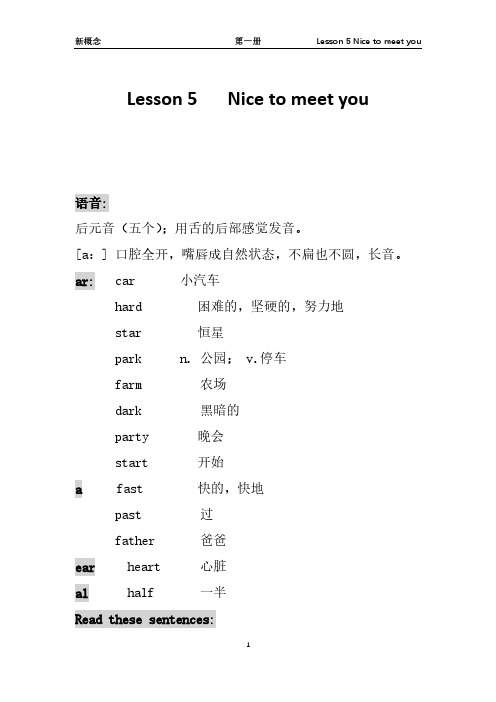
Lesson 5 Nice to meet you语音:后元音(五个);用舌的后部感觉发音。
[a:] 口腔全开,嘴唇成自然状态,不扁也不圆,长音。
ar: car 小汽车hard 困难的,坚硬的,努力地star 恒星park n. 公园; v.停车farm 农场dark 黑暗的party 晚会start 开始a fast 快的,快地past 过father 爸爸ear heart 心脏al half 一半Read these sentences:1. You can't park your car on the farm.你不可以把车停在农场里。
2. Her father is a hard-hearted man.她父亲是个心肠很硬的人。
3. The party starts at half past ten.晚会在十点半开始。
4. I can't see the stars in the dark sky.在黑暗的天空中我看不到星星。
[ɔ] 发音时舌尖要离开下齿酿,口形椭圆.肌肉放松,短音。
闭音节单词中的ojob 工作clock 钟表long 长的song 歌曲shop 商店stop 停止lost 丢失got 得到boss 老板hot 热的,受欢迎的a watch 手表water 水Read these sentences:1. She lost that job, but she got this job.她失去了那份工作,但又找到了这份工作。
2. The clock often stops. 这个钟表经常停。
3. The love song is not long, but it is very hot.这首爱情歌曲并不长,但却很受欢迎。
4. The boss lost a clock and a watch in the shop.老板在商店里丢了一个钟表和一块手表。
[ɔ:]发音时舌尖要离开下齿眼,口形小于短音[ɔ],嘴唇收圆,长音。
新概念英语第一册Lesson5课件
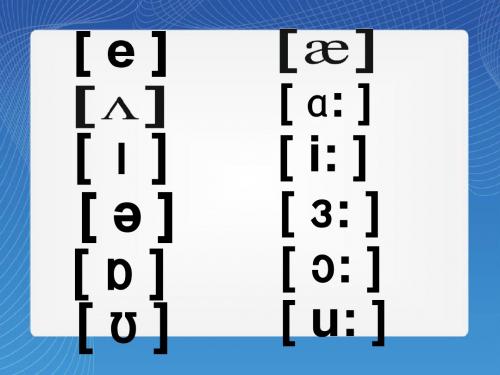
your
his
her
its
our
your
their
名词 性物 mine 主代 词
yours his hers
its ours yours theirs
my • 1. This is not _________ kite. This kite is very small,mine but _________ is very big. ( I )
She's Japanese.
Chang-woo
He's Korean.
Luming
He's Chinese.
Xiaohui
She's Chinese, too.
French
German
Japanese
Korean
Chinese
Chinese
Mr. /'mistə/ 先生 Miss /mɪs/ 小姐 good /gud/ 好的 morning /'mɔ:niŋ/ 早上 afternoon 下午 evening 晚上 new /nju:/ 新的 old 旧的 student /'stju:dənt/ 学生 nice /naɪs/ 美好的 meet /mi:t/ 遇见 too /tu:/ 也(一般放在肯定句和疑问句的末尾) make /meik/ 牌号,制作· · ·
• • • • • •
What make is it? It's an English car. What make is it? It's an American car. What make is it? It's an Italian car.
(完整版)新概念英语第一册第5课_课件
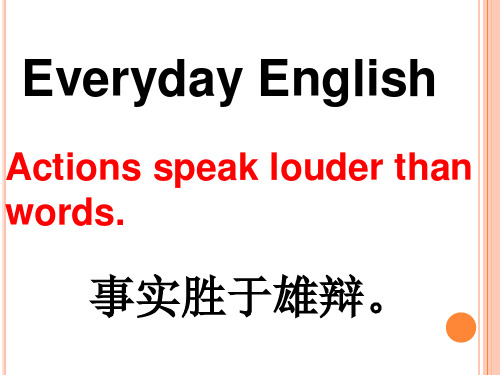
Xiaohui is a Chinese student.
3个冠词
a,an是不定冠词,一个,用于: 可数名词单数前面 用在短文中第一次出现的名词之前
[a用在普通名词前面,an用于元音音素 (元音发音的单词)前面]
a pen /an apple /an umbrella /an egg /an hour /
4. I can’t see the stars in the dark sky.
[Ɔ]
闭音节中的O job clock long song shop stop lost got boss hot a 发[ɔ]的 watch water
句子中的音标
1. She lost that job, but she got this job.
the是定冠词,表示特指
The man is my teacher.
宾格代词顺口溜: 我是me,你是You ; 男他him ,女她her ,动物的它是It; 我们us ,你们You ,他们them.
音标
[ɑ:]
ar car hard star park farm dark party start
meet [mi:t] v.遇见
同音词meat
非正式问候 ---Nice to meet you. --- Nice to meet you, too. 正式问候 --- How do you do? --- How do you do?
too [tu:] adv. 也
用在肯定句和疑问句中,否定句 中用either。 too 和either’ 一般放在句末,并 用逗号隔开。 请用too分别造肯定句和疑问句 Jacky is not a bad student. Rain is not a bad student, either.
新概念英语第一册lesson5-6

Lesson 5 Nice to meet you !
Listen to the tape ,then answer this question “How many students are there?”
一. Look at the video,then answer this question “Is Chang-woo Chinese?”
冠词:冠词作为一种虚词,在英语中只能和名词一起使用。分为不定冠词和定 冠词。
不定冠词有两个,a 和 an。a用在辅音开头的单词前面;an用于以元音开头的 单词前。
1) 不定冠词用在单数可数名词前表示“某一个”。 如:There is a policeman at the door.
2) 不定冠词用在单数可数名词之前,表示“任何,每个”。 如: A car must be insured.
四. Write these with short forms : Here is your pen .Here’s your pen . 1.It is not American . 2.It is English . 3.He is Italian . 4.She is not Japanese . 5.That is a teacher . 6.He is not French . 7.She is German .
二. New words and expressions 1)About nationality 关于国籍 2)About cars关于汽车品牌
Chinese 中国的;中国人 China 中国
French 法国的;法国人 France 法国
新概念英语第一册Lesson 5 Nice to meet you.
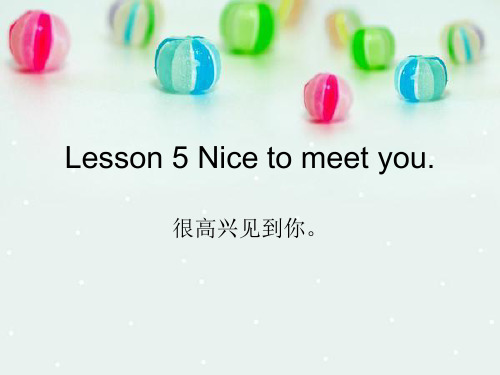
Watch a video and answer
:
How many people are there in the flash? Is Chang-woo Chinese?
17
good new
morning Mr.
student
Miss
French
German nice Korean meet Chinese
Go and open the window, Joe, and show me the photo. [au] – ou, ow about, round, down, town I found a mouse in the house.
Read the words
face same game play waste hate late hay complain famous
Go and open the window, Joe, and show me the photo. [au] – ou, ow about, round, down, town I found a mouse in the house.
Read the words
face same game play waste hate late hay complain famous
5. too也
通常放在肯定句或者疑问句的末尾,和句 子的主干部分用”,”隔开。
She is French. Iam French, too. 在否定句中用”either”表示”也”,也是常常 放在句末,和句子的主干部分用”,”隔开。 I am not Japanese, either.我也不是日本人。
I
life quiet mind price die shy white lie high
新概念英语第一册(Lesson5)课文及学习笔记-全
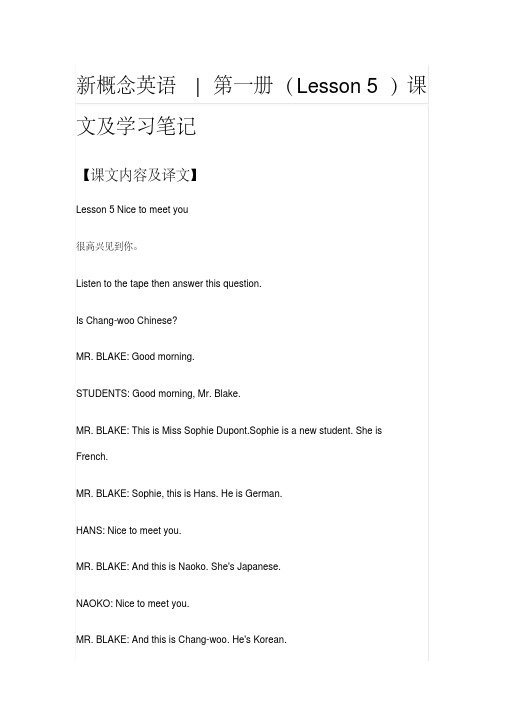
新概念英语| 第一册(Lesson 5)课文及学习笔记【课文内容及译文】Lesson 5 Nice to meet you很高兴见到你。
Listen to the tape then answer this question.Is Chang-woo Chinese?MR. BLAKE: Good morning.STUDENTS: Good morning, Mr. Blake.MR. BLAKE: This is Miss Sophie Dupont.Sophie is a new student. She is French.MR. BLAKE: Sophie, this is Hans. He is German.HANS: Nice to meet you.MR. BLAKE: And this is Naoko. She's Japanese.NAOKO: Nice to meet you.MR. BLAKE: And this is Chang-woo. He's Korean.CHANG-WOO: Nice to meet you.MR. BLAKE: And this is Luming. He is Chinese. LUMNG: Nice to meet you.MR. BLAKE: And this is Xiaohui. She's Chinese, too. XIAOHUI: Nice to meet you.布莱克先生:早上好。
学生:早上好,布莱克先生。
布莱克先生:这位是索菲娅.杜邦小姐。
索菲娅是个新学生。
她是法国人。
布莱克先生:索菲娅,这位是汉斯。
他是德国人。
汉斯:很高兴见到你。
布莱克先生:这位是直子。
她是日本人。
直子:很高兴见到你。
布莱克先生:这位是昌宇。
他是韩国人。
昌宇:很高兴见到你。
布莱克先生:这位是鲁明。
他是中国人。
鲁明:很高兴见到你。
- 1、下载文档前请自行甄别文档内容的完整性,平台不提供额外的编辑、内容补充、找答案等附加服务。
- 2、"仅部分预览"的文档,不可在线预览部分如存在完整性等问题,可反馈申请退款(可完整预览的文档不适用该条件!)。
- 3、如文档侵犯您的权益,请联系客服反馈,我们会尽快为您处理(人工客服工作时间:9:00-18:30)。
疯狂的 事实
男人 旗帜
手 猫 抓住 老鼠
Lesson 5 Nice to meet you.
he
China 中国
Chinese 中国人
Japan 日本
[dʒə‘pæ n]
he
she
Japanese 日本人
[‘dʒæ pə’ni:z]
Korea 韩国
[kə’riə]
he Korean 韩国人
[kə’riən]
再见
good bye
晚安
good night
祝你好运 good luck
课文讲解
• Good用法拓展 • 1,be good at 善于,在 …方面学的好 • 2,be good to sb 对某人好 • 3,be as good as one’s words 说话算数 • 4,as good as 和…一样好
he
France 法国
[fra:ns]
French 法国人
[frentʃ]
he
Germany 德国
[’dʒə:məni]
巴拉克
German 德国人
[’dʒə:mən]
某国
(中) China [‘t∫aɪnə]
(日) Japan [dʒə‘pæ n]
(韩) Korea [kə’riə]
(德) Germany [’dʒɜ:məni]
• ② adj. 和蔼的,友好的 He is very nice to his neighbours.
• ③ adj. 使人高兴的,令人愉快的 It is so nice to have you here.
too
• adv.用于肯定句中(强调也) • adv.太过于…… • eg:She talks too much.
• adj.瑞典的 • n.瑞典人
Swedish
• Dupont小姐不是瑞典人,她是法国人。
• Miss Dupont is not Swedish. She is French.
• Sweden n.瑞典(国名)
English
• adj.英国的 • n.英语,英国人
• England n. 英格兰,英国
具体到某一天用on 时间点用at
课文讲解
• Mr. 先生
Mr.用于男士的姓之前,不能单独使用,如课文 中的 Mr.Blake;而sir 一般单独使用,是对长者、 上司或男顾客的尊称,如:Sorry, sir. 对不起, 先生。
• Miss 小姐 一般用于指未婚女子,不过有时在不知道 对方是否已婚时也可使用
(法) France [fra:ns]
某国的,某国人
Chinese [tʃaɪ‘ni:z]
Japanese [‘dʒæ pə’ni:z]
Korean [kə’riən] German [’dʒɜ:mən] French
[frentʃ]
练习缩写形式。
Here is your pen .
Here’s your pen .
American
• adj. 美国的 • n. 美国人
• America n.美国
Italian
• adj. 意大利的 • n.意大利人,意大利语
• Italy n.意大利(国名)
What make (牌子)is it?
It’s a Toyota 丰田 It’s a Japanese car.
Q: What nationality is she /he ? A: She’s/He’s
French/Chinese/German/Korean Q: What is your nationality ? A: I am American / Italian / English .
nice
• ① adj. 美好的,好看的 It’s a nice day today, isn’t it? That's a nice shirt.
It’s too hot today.
Lesson6
What make is it?
make
• n.(产品的)牌号 • 我的衬衫是韩国牌子的。 • My shirt is a Korean make. • 你的手表是什么牌子的? • What make is your watch? • v.制造,做 • 我想做一个蛋糕。 • I want to make a cake.
• Mrs 女士
我是哪国人?
• 在说自己是哪一个国家的人时,使用句型: I’m...... 例如:I'm Chinese.
• 用以下单词来做一个替换练习吧! Franch,German,Japanese,Korean, Italian,American,Swedish,English
如何询问国籍呢?
5.That is a teacher . 6.He is not French . 7.She is German .
That’s a teacher. He’s not French. She’s German.
课文讲解
• Good morning. 早上好
那么下午好和晚上好还记得怎么说吗?
Good afternoon. Good evening.
课文讲解
• Morning用法拓展 • 1,in the morning
• 2,在星期天早上: on Sunday morning • 3,在一个冬天的早晨: on a winter morning
• Eg:I go to school____8 o’clock in the morning. A.at B.in C.on D.for
英语音标 ∕e∕ ∕æ ∕
•∕ e ∕ ---- e
•get
得到
•beg 乞讨
•never 从不
•let
让
•rest
休息
•Ben
人名
•wet
湿
ห้องสมุดไป่ตู้ ∕ e ∕ ---- ea
•sweat •dead •bread •heaven
汗 死的 面包 天堂
∕ æ ∕ ---- a
• mad • fact • man • flag • hand • cat • catch • rat
1.It is not German .
It isn’t German.
2.This is not an umbrella . This isn’t an umbrella.
3.He is Chinese .
He’s Chinese.
4.She is not Japanese . She’s not Japanese.
